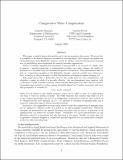Compressive wave computation
Author(s)
Demanet, Laurent; Peyre, Gabriel
DownloadDemanet article in FoCS.pdf (575.1Kb)
PUBLISHER_POLICY
Publisher Policy
Article is made available in accordance with the publisher's policy and may be subject to US copyright law. Please refer to the publisher's site for terms of use.
Terms of use
Metadata
Show full item recordAbstract
This paper presents a method for computing the solution to the time-dependent wave equation from the knowledge of a largely incomplete set of eigenfunctions of the Helmholtz operator, chosen at random. While a linear superposition of eigenfunctions can fail to properly synthesize the solution if a single term is missing, it is shown that solving a sparsity-promoting ℓ 1 minimization problem can vastly enhance the quality of recovery. This phenomenon may be seen as “compressive sampling in the Helmholtz domain.”
An error bound is formulated for the one-dimensional wave equation with coefficients of small bounded variation. Under suitable assumptions, it is shown that the number of eigenfunctions needed to evolve a sparse wavefield defined on N points, accurately with very high probability, is bounded by C()logNloglogN where C(η) is related to the desired accuracy η and can be made to grow at a much slower rate than N when the solution is sparse. To the authors’ knowledge, the partial differential equation estimates that underlie this result are new and may be of independent mathematical interest. They include an L [superscript 1] estimate for the wave equation, an L [infinity symbol]−L[superscript 2] estimate of the extension of eigenfunctions, and a bound for eigenvalue gaps in Sturm–Liouville problems.
In practice, the compressive strategy is highly parallelizable, and may eventually lead to memory savings for certain inverse problems involving the wave equation. Numerical experiments illustrate these properties in one spatial dimension.
Date issued
2011-02Department
Massachusetts Institute of Technology. Department of MathematicsJournal
Foundations of Computational Mathematics
Publisher
Springer-Verlag
Citation
Demanet, Laurent, and Gabriel Peyré. “Compressive Wave Computation.” Foundations of Computational Mathematics 11.3 (2011): 257–303. Web.
Version: Original manuscript
ISSN
1615-3375
1615-3383